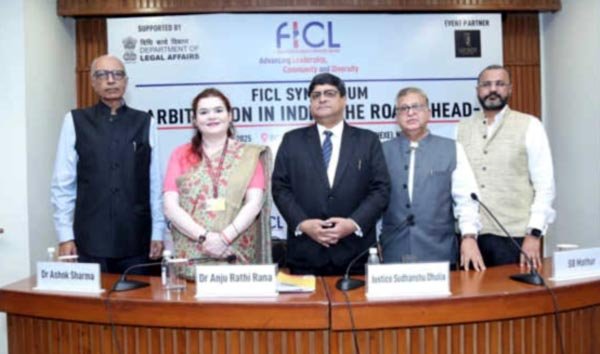By Sangeeta Sharma
New Delhi, July 24 (UNI) “Arbitration is nothing new to India, it is embedded in our cultural and historical roots,” remarked Supreme Court judge Justice Sudhanshu Dhulia, highlighting how ancient Indian texts and village practices like ‘Grameshwar’ and ‘Panch Parmeshwar’ embodied arbitration as a divine duty. “When you sit on the seat of an arbitrator, you are like God,” he said, emphasising impartiality as its foundation.
Speaking at a symposium organised by the Federation of Corporate Lawyers (FICL), Justice Dhulia observed that arbitration, rooted in equity, was intended as a quicker, simpler alternative to litigation. However, he lamented that its true purpose is defeated when proceedings become “interminable, complex, and expensive,” mirroring court procedures.
Quoting Supreme Court observations, he said arbitration has become a “rich man’s litigation,” with poor people rarely accessing it due to high costs.
Justice Dhulia urged stakeholders to utilise Section 28 of the Arbitration and Conciliation Act, 1996, which empowers arbitrators to decide disputes based on equity if parties expressly agree.
“Nobody refers to it. It seems quite strange because equity can deliver faster justice, but both parties must trust the arbitrator completely,” he said.
He also questioned the frequent amendments to arbitration laws to address inefficiencies, while critical laws benefitting the poor remain stagnant.
“How many amendments have been brought in the Workmen Compensation Act or Zamindari Abolition Act?” he asked, underlining systemic neglect.
Dr Anju Rathi Rana, India’s first woman Law Secretary, linked arbitration reforms with the country’s economic goals. “Under Prime Minister Narendra Modi’s vision to become a $5 trillion economy by 2028 and $7 trillion by 2030, our legal and regulatory frameworks must match the speed and scale of ambition,” she said.
Dr Rana emphasised that arbitration strengthens investor confidence, enforceability of contracts, and swift justice beyond courtrooms.
She cited Modi’s 2016 statement urging a “vibrant ecosystem for alternate dispute resolution,” which catalysed legislative reforms including the 2015 and 2019 amendments introducing fast-track procedures, defined timelines, and the Arbitration Council of India to instill professionalism.
She also highlighted the landmark Mediation Act, 2023, creating India’s first institutional mediation framework, alongside technology initiatives like the National Judicial Data Grid and Virtual Courts to ensure speed and transparency in justice delivery.
“Building an arbitration system is a shared responsibility of the bench, bar, corporates, and institutions,” Dr Rana asserted, urging stakeholders to introspect whether arbitration is a conscious choice or compulsion for businesses, and whether contracts are drafted to promote enforceability.
Founder Chairman of AIFC, Mr Ashok Sharma, echoed similar concerns, stressing the need to modernise arbitration and ensure a speedy legal system to instill investor faith.
Concluding his address, Justice Dhulia called for reclaiming India’s traditional ethos of arbitration as an equitable, community-driven justice mechanism rather than letting it remain, in his words, “a rich man’s litigation trapped in legal complexities.”











